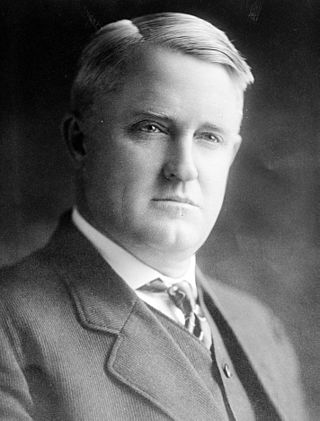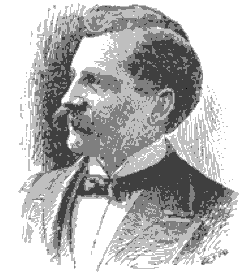
Pawnee is a city and county seat of Pawnee County, Oklahoma, United States. The town is northeast of Stillwater at the junction of U.S. Route 64 and State Highway 18.
Tom Colbert is a former Associate Justice of the Oklahoma Supreme Court. He was appointed to the Court's District 6 seat in 2004, by Governor Brad Henry, becoming the first African-American to serve on the court. On January 4, 2013, he was sworn in as Chief Justice of the Supreme Court, and served In that post until January 2015. After completing his two-year term as Chief Justice, he resumed his previous position on the court as Associate Justice representing the 6th Judicial District. On January 19, 2021, Colbert’s retirement was announced by the Oklahoma Supreme Court, effective February 1 of the same year.

Robert Lee Williams was an American lawyer, judge, and the third governor of Oklahoma. Williams played a role in the drafting of the Oklahoma Constitution and served as the first Oklahoma Supreme Court chief justice. He also served as a United States circuit judge of the United States Court of Appeals for the Tenth Circuit and as a United States district judge of the United States District Court for the Eastern District of Oklahoma. As third Governor, Williams oversaw the state's response to the recent United States Supreme Court's ruling against Jim Crow laws and its involvement in the First World War (1914/1917-1918). He instituted the Oklahoma State Board of Affairs which provided central purchasing services to various state departments, agencies, boards and bureaus. Due to his direct administrative role and concentration of power, Governor Williams counteracted the previous loss of executive power and disagreements with the Oklahoma Legislature under previous second Governor Lee Cruce.
Louis Sulzbacher was the first continental American appointed as Associate Justice of the newly created Supreme Court of Puerto Rico in 1900. Appointed by President William McKinley he assumed his post in August 1900 and served until 1904.

Douglas Lyman Edmonds was an American jurist, serving on the Supreme Court of California and the United Nations' International Law Commission.

John Hazelton Cotteral was a United States circuit judge of the United States Court of Appeals for the Eighth Circuit and the United States Court of Appeals for the Tenth Circuit and previously was a United States district judge of the United States District Court for the Western District of Oklahoma.

Rollin Harlow Person was an American jurist who served as an associate justice of the Michigan Supreme Court.

Bayard Taylor Hainer (1860–1933) was a justice of the Territorial Oklahoma Supreme Court in 1898.
Charles W. Mason (1887–1969) was a justice of the Oklahoma Supreme Court from 1923 to 1931, serving as Vice Chief Justice in 1927 and as chief justice from 1929 to 1931. Born in Stafford, Ohio, he was educated at Grant University and at Washington and Lee University. He and his parents settled in what is now Nowata, Oklahoma, which became his home for the rest of his life. He was admitted to the Oklahoma bar in June 1911. Mason also served in the U. S. military in both World War I and II. His final rank was colonel. He died in 1969.
Edwin Ruthven McNeill, Jr. was a justice of the Oklahoma Supreme Court from 1931 to 1937, representing District 6. He also served as chief justice from 1934 to 1936.
James Waddey "J.W." Clark was a justice of the Oklahoma Supreme Court from 1925 to 1933. He was born in Allisona, Williamson County, Tennessee to Joseph Poindexter and Cora Belle Waddey. After finishing public school, James became a traveling salesman, then went into the mercantile business, and finally went into business for himself. He took a course in law in 1907 and 1908, then enrolled in Cumberland University in 1909. By 1910, he had opened a law practice and won election to the Oklahoma legislature. In 1912, he was elected County Attorney for Atoka County, Oklahoma and was reelected after his first two-year term expired. In 1917, he returned to private law practice in Atoka, where he remained until he won election to the Oklahoma Supreme Court in 1924, filling a vacancy and taking office in 1925. He was reelected for a full 6-year term in 1926.

John H. Burford was an American judge who served as justice of the Territorial Oklahoma Supreme Court from 1892 to 1906, serving as the final Chief Justice of that court from 1898 to 1903. After the territorial supreme court was dissolved at statehood, Burford served as City Attorney for Guthrie, Oklahoma, where he had made his home. He was the Republican Party nominee for U. S. Senator in 1914, but lost the election.
Gibson A. Brown was a native of Washington County, Texas. His parents were James P. and Mary A., both natives of Georgia who had moved to a farm in 1847. Brown became an attorney and moved to Greer County, Texas.
Wayne W. Bayless (1895-1975) was an attorney and politician from Claremore, Oklahoma, who served as a justice on the Oklahoma Supreme Court between 1932 and 1948. A member of the Democratic party, he had served previously in the Oklahoma House of Representatives, a candidate for the U.S. House of Representatives in 1924 and as a District Judge in 1926–1929.
Samuel W. Hayes (1875–1941) was born in Arkansas, and moved to Texas with his parents when he was a small child. He completed his basic education in Texas, then attended the University of Virginia. He apparently did not graduate, but his college experience sufficed to qualify him as a school teacher. He spent the next three years teaching in the community of Ryan in the Chickasaw Nation, then part of the Indian Territory. He also began studying law in a local law office and was admitted to the Territorial Bar in 1899.
Denver Norton Davison was an American jurist from Oklahoma. Born in Rich Hill, Missouri, he moved to the Choctaw Nation in Indian Territory in 1906 to work in the coal mines there. He earned a law degree from the University of Oklahoma in 1915, and entered private practice, until he was appointed to the Oklahoma Supreme Court in 1937. When he died at age 91 on April 28, 1983, he had served for over 41 years, longer on the Oklahoma Supreme Court than any other justice until that time. He had also served an unprecedented three terms as chief justice.
Thomas Horner Owen was a judge of the Oklahoma Supreme Court. Born and raised in Arkansas, he moved to Indian Territory in 1894. According to Victor Harlow's version of Owen's biography, Owen was born near Jasper, Arkansas on February 24, 1873.
Harry L. S. Halley (1894-1985), was a life-long Oklahoman who served on the Oklahoma Supreme Court from 1949 to 1967, including two terms (1966–1967) as chief justice. Born in Antlers, Oklahoma, before statehood, when that area was part of the Choctaw Nation, he moved to Tulsa after earning a law degree from the University of Oklahoma and then serving in the U.S. Army during World War I. He was a district court judge in Tulsa from 1931 to 1947. After spending several years in a private law practice, he was named to the state supreme court as an associate justice.
Summers T. Hardy was a native of Arkansas who came to Indian Territory in with his family in 1892, settling in what would become Ardmore, Oklahoma. He read law and passed the bar exam in 1897, then entered private law practice in Ardmore and Madill, Oklahoma. Hardy met a young woman from Texas in Ardmore named Laura Scribner, whom he married in 1900. He got into local politics and was elected as a delegate to the Oklahoma Constitutional Convention in 1906. He was named President of the Madill City School board in 1907–1908. He ran for a District 16 judgeship in Marshall County and won, serving 1911–1913, then served briefly in District 29 in 1914.
Finis E. Riddle, known better as F. E. Riddle, was a frontier lawyer and Oklahoma Supreme Court Justice.






